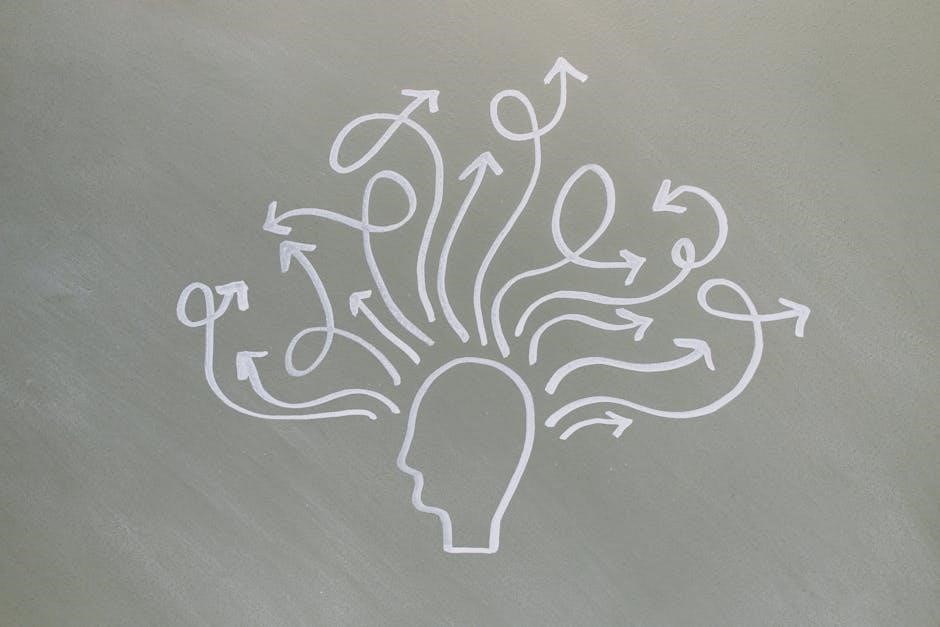The 10th edition of Fundamentals of Abnormal Psychology by Ronald J. Comer is a bestselling textbook that provides a comprehensive overview of mental disorders, blending theory with real-world applications. It covers the evolution of abnormal psychology, key models of abnormality, and modern approaches to diagnosis and treatment. This edition incorporates the psychological impact of the COVID-19 pandemic, offering students a contemporary perspective. Available in hardcover, e-book, and PDF formats, it is widely used in academic settings for its clear and engaging presentation of complex topics.
1.1 Overview of the Book and Its Importance
Fundamentals of Abnormal Psychology, 10th Edition, is a bestselling textbook that provides a comprehensive and modern exploration of mental disorders. It covers the latest theories, diagnostic criteria, and treatment approaches, making it an essential resource for students and instructors. The book’s clear and engaging style, along with its inclusion of real-world applications and cross-cultural perspectives, underscores its importance in understanding abnormal psychology effectively.
1.2 Authors and Their Contributions to the Field
Ronald J. Comer, a renowned psychologist and professor at Princeton University, is the primary author of Fundamentals of Abnormal Psychology. His 46-year academic career has significantly shaped the field, offering insights into mental disorders. Co-author Jonathan S. Comer adds contemporary perspectives. Together, they provide a comprehensive understanding of abnormal psychology, blending research and clinical expertise. Their work is widely acclaimed for its clarity and depth.
Historical Perspectives on Abnormal Psychology
This chapter explores the evolution of abnormal psychology, tracing its development from ancient beliefs to modern theories. It highlights key milestones and cultural shifts that shaped the field, providing a foundation for understanding contemporary approaches to mental health.
2.1 Evolution of Abnormal Psychology: Past and Present
Abnormal psychology has evolved significantly, from ancient beliefs in supernatural forces to modern biological and psychological explanations. The 10th edition highlights this progression, emphasizing historical milestones and the integration of contemporary theories. It also addresses the impact of the COVID-19 pandemic, showcasing the field’s adaptability and ongoing development in understanding mental health.
2.2 Key Milestones in the Development of Abnormal Psychology
Abnormal psychology’s development includes milestones like ancient beliefs in supernatural causes, the rise of asylums, and Freud’s psychoanalysis. The 20th century saw biological advancements and the introduction of the DSM. Recent milestones include the integration of cultural factors, neuroimaging technologies, and teletherapy, with the 10th edition addressing contemporary issues like the psychological impact of the COVID-19 pandemic.

Models of Abnormality
The text explores biological, psychological, and sociocultural models, offering insights into mental disorders through diverse perspectives. It integrates theory with contemporary research, including updated content on the COVID-19 pandemic’s psychological impact.
3.1 Biological, Psychological, and Sociocultural Models
The 10th edition examines biological, psychological, and sociocultural models, integrating theories to understand mental disorders. It explores how biological factors, psychological processes, and cultural influences interact, offering a holistic view. The text also addresses contemporary issues, such as the psychological impact of the COVID-19 pandemic, providing a modern perspective on these foundational models of abnormality.
3.2 The Role of Diagnostic Manuals in Understanding Abnormality
The 10th edition highlights diagnostic manuals like the DSM-5 and ICD-11, which standardize criteria for identifying mental disorders. These manuals provide a common language for clinicians and researchers, ensuring consistent diagnoses. The text discusses their evolution and limitations, emphasizing their role in guiding treatment and research. Updates in the 10th edition reflect contemporary understandings, including the impact of the COVID-19 pandemic on mental health diagnostics.

Anxiety, Obsessive-Compulsive, and Related Disorders
The 10th edition explores anxiety disorders, including generalized anxiety and panic disorders, and obsessive-compulsive disorders. It discusses symptoms, diagnostic criteria, and evidence-based treatments, emphasizing contemporary approaches.
4.1 Classification and Symptoms of Anxiety Disorders
Anxiety disorders are classified into types like generalized anxiety, panic disorder, and social anxiety. Symptoms include excessive worry, restlessness, and fear. Physical signs such as rapid heartbeat and sweating are common. These disorders significantly impair daily functioning, making timely diagnosis and treatment essential for recovery and improved mental health outcomes.
4.2 Obsessive-Compulsive and Related Disorders: Diagnosis and Treatment
Obsessive-Compulsive Disorder (OCD) is characterized by intrusive thoughts and compulsive behaviors. Diagnosis involves identifying recurring obsessions and compulsions that significantly disrupt daily life. Treatment options include Cognitive Behavioral Therapy (CBT), particularly Exposure and Response Prevention (ERP), and pharmacotherapy with SSRIs. Early intervention is critical for managing symptoms and improving quality of life in individuals with OCD and related disorders like hoarding or body dysmorphic disorder.
Depressive and Bipolar Disorders
Depressive and bipolar disorders significantly impact mental health, affecting millions. This chapter explores their symptoms, types, and treatments, offering insights into effective management strategies for these conditions.
5.1 Understanding Depression: Causes, Symptoms, and Types
Depression involves persistent sadness, loss of interest, and impaired functioning. It can manifest as major depressive disorder, persistent depressive disorder, or postpartum depression. Biological, psychological, and sociocultural factors contribute to its development. Symptoms include changes in mood, sleep disturbances, and cognitive impairments. Understanding these aspects is crucial for accurate diagnosis and effective treatment approaches.
5.2 Bipolar Disorders: Diagnosis, Treatment, and Management
Bipolar disorders are characterized by extreme mood swings between mania and depression. Diagnosis involves identifying episodes of mania or hypomania. Treatment often combines psychotherapy, mood stabilizers, and antipsychotics. Management focuses on preventing relapses and improving quality of life. Early intervention and personalized care are essential for effective outcomes.
Trauma and Stress-Related Disorders
This chapter explores disorders stemming from traumatic events, such as PTSD and acute stress disorder. It examines the psychological and emotional impacts of trauma on individuals.
6.1 Post-Traumatic Stress Disorder (PTSD) and Acute Stress Disorder
PTSD and acute stress disorder are trauma-related conditions triggered by extreme events like combat or natural disasters. PTSD involves prolonged symptoms such as flashbacks, hypervigilance, and emotional numbness. Acute stress disorder shares similar symptoms but lasts fewer than 30 days. Both disorders highlight the psychological impact of trauma and the body’s stress response. Cultural factors can influence symptom expression and diagnosis, offering insights into recovery and treatment approaches.
6.2 The Impact of Trauma on Mental Health
Trauma profoundly affects mental health, leading to emotional and psychological distress. It can result in long-term issues like anxiety, depression, or hypervigilance. The severity of trauma, duration of exposure, and individual resilience influence outcomes. Support systems and coping mechanisms play a crucial role in recovery, while lack of intervention may worsen symptoms. Understanding trauma’s impact is essential for effective diagnosis and treatment strategies in abnormal psychology.

Disorders Featuring Somatic Symptoms
These disorders involve physical symptoms linked to psychological distress, such as somatic symptom disorder and conversion disorder, often rooted in psychological or biological factors, requiring integrated treatment approaches.
7.1 Somatic Symptom Disorder and Illness Anxiety Disorder
Somatic symptom disorder involves excessive thoughts or anxiety about physical symptoms, often with minimal medical explanation. Illness anxiety disorder is characterized by fear of illness without significant symptoms. Both disorders highlight the mind-body connection, emphasizing psychological distress manifesting physically. The 10th edition details diagnostic criteria, treatment approaches, and the role of cognitive-behavioral therapy in addressing these conditions, providing a holistic understanding of their complexity and management.
7.2 Conversion Disorder and Factitious Disorders
Conversion disorder, now often termed functional neurological symptom disorder, involves neurological symptoms like paralysis or seizures without medical cause. Factitious disorders involve falsifying symptoms for attention. The 10th edition explores these conditions, emphasizing psychological factors and treatment strategies. It provides insights into diagnosis and intervention, helping students grasp the complexities of these disorders and their impact on mental health.
Eating Disorders and Related Conditions
Eating disorders, including anorexia nervosa, bulimia nervosa, and binge-eating disorder, are explored, highlighting their psychological and biological roots and societal influences.
8.1 Anorexia Nervosa, Bulimia Nervosa, and Binge-Eating Disorder
Anorexia nervosa is characterized by extreme weight loss due to restrictive eating. Bulimia nervosa involves cycles of bingeing and purging. Binge-eating disorder is marked by recurrent episodes of excessive food consumption without compensatory behaviors. These disorders are often rooted in psychological factors, societal pressures, and biological vulnerabilities, significantly impacting mental and physical health. The textbook explores their symptoms, causes, and treatment approaches in depth.
8.2 Psychological and Biological Factors in Eating Disorders
Eating disorders are influenced by psychological factors such as cognitive distortions, low self-esteem, and societal pressures emphasizing thinness. Biological factors include genetic predispositions, neurotransmitter imbalances, and hormonal dysregulation affecting hunger and satiety. These factors interact, contributing to the development of anorexia nervosa, bulimia nervosa, and binge-eating disorder. Understanding this interplay is crucial for effective diagnosis and treatment, as highlighted in the 10th edition of Fundamentals of Abnormal Psychology;
Personality Disorders
Fundamentals of Abnormal Psychology, 10th Edition explores personality disorders, emphasizing their impact on individuals and society. It provides insights into their classification, symptoms, and cultural influences, offering a comprehensive understanding of these complex conditions.
9.1 Classification and Characteristics of Personality Disorders
Fundamentals of Abnormal Psychology, 10th Edition details the classification of personality disorders into three clusters: A (odd/eccentric), B (dramatic/emotional), and C (anxious/fearful). It explores disorders like paranoid, borderline, and obsessive-compulsive, highlighting their distinct symptoms and diagnostic criteria. The text provides a clear framework for understanding these complex conditions, aiding students in identifying and differentiating various personality disorders effectively.
9.2 Borderline, Antisocial, and Narcissistic Personality Disorders
The 10th edition explores borderline, antisocial, and narcissistic personality disorders in depth. Borderline disorder is marked by emotional instability and unstable relationships. Antisocial disorder involves a disregard for others’ rights, manipulative behavior, and impulsivity. Narcissistic disorder is characterized by grandiosity, a need for admiration, and a lack of empathy. These conditions highlight the complexities of personality pathology and their impact on functioning.

Treatment Approaches in Abnormal Psychology
Treatment approaches include psychotherapy, psychopharmacology, and cultural considerations. These methods address mental disorders effectively, emphasizing evidence-based practices and personalized care to improve patient outcomes and quality of life.
10.1 Psychotherapy, Psychopharmacology, and Other Interventions
Psychotherapy, psychopharmacology, and other interventions are core treatment approaches in abnormal psychology. These methods address mental disorders through evidence-based practices, combining psychological therapies with medication. Techniques like CBT and SSRIs are commonly used. Other interventions may include lifestyle changes, support groups, and alternative therapies. These approaches aim to reduce symptoms, improve functioning, and enhance quality of life for individuals with mental health conditions.
10.2 The Role of Cultural Factors in Treatment Effectiveness
Cultural factors significantly influence treatment effectiveness in abnormal psychology. Sensitivity to cultural beliefs, values, and practices is essential for accurate diagnosis and successful therapy. Language barriers, societal norms, and traditional healing practices can impact adherence to treatments. Incorporating cultural competence into psychotherapy and psychopharmacology enhances trust and outcomes, ensuring interventions are tailored to diverse patient needs and backgrounds, improving overall mental health care delivery.